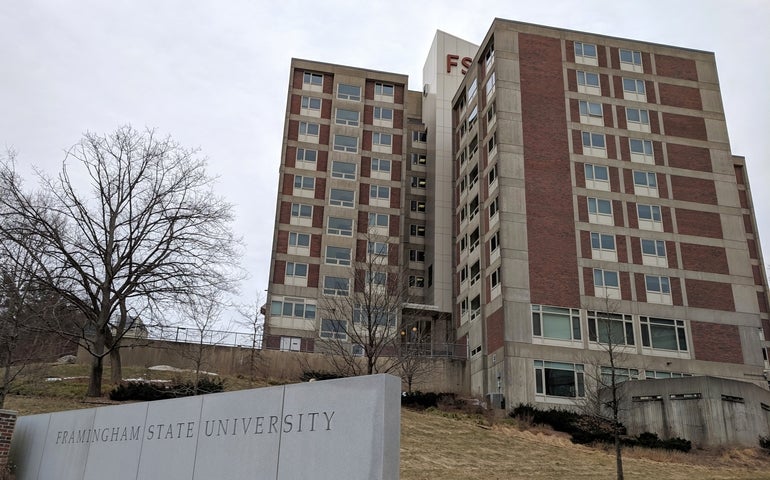While still grappling with the immediate impacts of the coronavirus pandemic, state higher education officials on Wednesday looked ahead to the longer-term challenges expected to face public campuses and their students.
“As challenging as it might be in the short-term, I think we’re all increasingly aware that what’s going on now is likely to have significant ramifications beyond the immediate moment,” Education Secretary James Peyser said during a remote meeting of the Board of Higher Education.
Peyser said the state’s higher education system should begin looking toward this fall and beyond, trying to understand the coming fiscal and operational challenges and get ahead of them to the degree possible.
“Even healthy institutions are struggling right now under this current environment,” he said.
As the new coronavirus was becoming more prominent in the United States last month, public and private colleges and universities across Massachusetts and the country suddenly had to shift into a remote-learning mode, closing their residence halls, canceling or postponing commencements and other events and moving their courses and services online.
Sheila Harrity, the board’s vice chair and the superintendent-director of the Montachusett Regional Vocational Technical School District, likened the situation to building an airplane while already in mid-air.
Board members projected that finances will be a significant and long-term issue for higher education campuses that, while incurring new costs associated with remote learning and other adjustments, are also facing reduced revenues from not having students on campus and an expected tightening of student and family budgets.
North Shore Community College President Pat Gentile, who chairs the Massachusetts Community Colleges Council of Presidents, said the state’s 15 community colleges “have already spent an enormous amount” of their fiscal 2020 budgets on the unexpected expenses of going remote.
The community colleges’ chief financial officers recently tallied the costs of additional cleaning, information technology and equipment at nearly $17 million, she said, and have estimated the pandemic’s overall impact on community colleges is at nearly $47 million.
“Although that seems like a whole lot of money, the CFOs believe it is a very conservative estimate,” Gentile said.
Gentile said that while everyone is encountering difficulties amid the public health crisis, the struggles “are deeper and much more challenging” for the lower- and middle-income students who make up the vast majority of community college students. She said many rely on food pantries, computer labs, libraries and tutoring centres on campus to complete their studies, along with an “in-person touch” to support them in their learning.
“Of all the losses our students are experiencing right now, I believe that this personalized sense of belonging and inclusion in the academy are one of the major losses for those never included in higher education previously,” she said.
The board’s student members and advisors detailed some of the obstacles their peers have run into into in the new remote learning landscape.
Kush Patel, who attends the University of Massachusetts Boston, said some students who have returned to homes in different time zones have difficulty accessing online lectures.
Anna Grady, a Bridgewater State University student, said resources still need to be made available for students with disabilities, especially those who are unable to effectively use technology to learn.
Mount Wachusett Community College student Abby Velozo raised the issue of retention, saying the pervasive uncertainty could drive students to drop out.
“Some people, this is their first semester or first year, and it’s scary,” Velozo said. “You don’t know what’s going to happen next.”
Higher Education Commissioner Carlos Santiago said there are “real questions about what our fall enrollments will look like.” He said he’s heard anecdotally of some students who are considering whether to stay, as they deal with job losses, added child care responsibilities, and “a degree of stress that I think is leading them to not prioritize their higher education experience.”
He said schools and faculties should make accommodations for students who need support.
“I think the student connection to our faculty and staff, the personal connection, is harder to deliver under the current modality, and I would just ask that empathy is probably a leading ingredient if we’re going to successfully get through this,” Santiago said.
Board member Alex Cortez said that in addition to students who may not be able to afford to continue their studies after the disruption of the pandemic, there will be others who could afford the expense but will choose not to.
“People are having near-death or near-to-near-death experiences, and it’s giving people pause,” he said.
Santiago said the response of the campuses so far “is really something we can celebrate,” praising their efforts to act quickly to keep students, faculty and staff safe.
He said most public higher education students have moved out of residence halls, though a small number who didn’t have other options remain on campus. About 300 have stayed on across the nine state university campuses, and about 1,000 across the four undergraduate UMass campuses, he said.
With dorms closed and food services suspended, schools have been issuing prorated refunds to their students for prepaid housing, dining and parking charges.
Fitchburg State University President Richard Lapidus, who chairs the State University Council of Presidents, said the decision to issue refunds was made in recognition of the financial hardships many students are now experiencing, and said the total cost of reimbursing state university students is $46.8 million. UMass officials have pegged the cost of their refunds at about $70 million.
The Board of Higher Education agreed to a resolution, offered by member Paul Mattera, voicing support for room, board and parking refunds and urging “the administration and the Legislature to work with the campuses to help offset the cost of rebates with appropriate funding.”
“The campuses are in survival mode now, or will soon be in survival mode now, and so they need the help,” Mattera, who chairs the Salem State University Board of Trustees, said.

